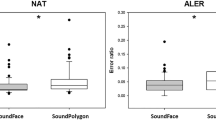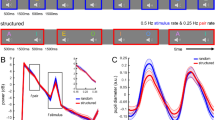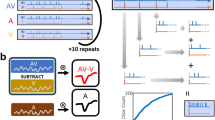Abstract
SOME characteristics of auditory and visual interaction were studied in 36 normal young adult subjects, using a method based on recognition of repetitions. This method extends and complements procedures developed by Averback and Sperling1, Broadbent2, and Shepard and Teghtsoonian3.
This is a preview of subscription content, access via your institution
Access options
Subscribe to this journal
Receive 51 print issues and online access
$199.00 per year
only $3.90 per issue
Buy this article
- Purchase on Springer Link
- Instant access to full article PDF
Prices may be subject to local taxes which are calculated during checkout
Similar content being viewed by others
References
Averback, E., and Sperling, G., in Information Theory (Fourth Lond. Symp., 1960), edit. by Cherrv, C., 196 (Butterworth, Inc., Washington, D.C., 1961).
Broadbent, D. E., Perception and Communication (Pergamon Press, New York, 1958).
Shepard, R. N., and Teghtsoonian, M., J. Exp. Psychol., 62, 302 (1961).
Cole, M., Chorover, S. L., and Ettlinger, G., Nature, 191, 1225 (1961).
Author information
Authors and Affiliations
Rights and permissions
About this article
Cite this article
BUSCHKE, H. Auditory and Visual Interaction in Man. Nature 195, 101–102 (1962). https://doi.org/10.1038/195101b0
Issue Date:
DOI: https://doi.org/10.1038/195101b0
This article is cited by
Comments
By submitting a comment you agree to abide by our Terms and Community Guidelines. If you find something abusive or that does not comply with our terms or guidelines please flag it as inappropriate.



